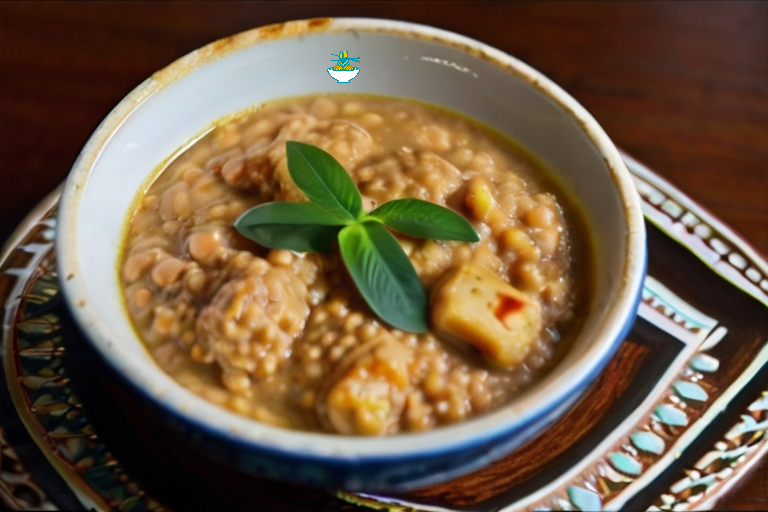Embark on a flavorful expedition through the heart of the Central African Republic with the traditional dish of Kossam. This beloved culinary delight encapsulates the vibrant culture, rich history, and diverse flavors of this enchanting region. Passed down through generations, Kossam represents more than just a meal; it is a celebration of community, heritage, and the bountiful ingredients found in the lush landscapes of Central Africa.
Join us as we unravel the secrets of Kossam, a dish that embodies the essence of Central African cuisine. From its origins in bustling markets to the kitchens of homes where stories are shared and memories are made, Kossam reflects the warmth and hospitality of the Central African people. Prepare to tantalize your taste buds with an explosion of flavors as we delve into the ingredients, techniques, and cultural significance behind this culinary masterpiece.
Ingredients:
- 1 cup millet or sorghum flour
- 2 cups water
- Pinch of salt (optional)
Instructions:
Prepare the Flour Mixture:In a mixing bowl, combine the millet or sorghum flour with the water. Stir well until the mixture is smooth and free of lumps.
Cooking the Porridge:
1- Pour the flour mixture into a medium-sized saucepan.
2- Place the saucepan over medium heat and bring the mixture to a boil, stirring constantly to prevent sticking.
3- Once boiling, reduce the heat to low and let the porridge simmer gently for about 10-15 minutes, stirring occasionally. The porridge should thicken and reach a smooth consistency.
Seasoning (Optional): If desired, add a pinch of salt to the porridge for seasoning. Adjust the amount according to your taste preference.
Serving:
1- Once the porridge has reached the desired consistency, remove it from the heat.
2- Serve the Kossam hot, either as a standalone dish or accompanied by traditional Central African side dishes such as grilled meat, fish, or vegetables.
3- Enjoy the comforting flavors and hearty texture of this authentic Central African dish!
Note: Kossam can be customized according to personal taste preferences by adding toppings such as sugar, honey, or milk for a sweeter version, or incorporating savory ingredients like cooked meat or vegetables for a more substantial meal. Experiment with different variations to discover your favorite way to enjoy this traditional Central African delicacy.
Nutritional Values:
Here are the approximate nutritional values for the ingredients used in the Kossam recipe:
1 cup Millet or Sorghum Flour:
- Calories: Approximately 500 kcal
- Carbohydrates: Approximately 110 grams
- Protein: Approximately 12 grams
- Fat: Approximately 2 grams
- Fiber: Approximately 8 grams
benefits:
- Millet or sorghum flour is rich in complex carbohydrates, providing sustained energy levels.
- It contains essential nutrients such as iron, magnesium, and phosphorus, which are important for maintaining overall health and vitality.
- Millet and sorghum are gluten-free grains, making them suitable for individuals with gluten intolerance or celiac disease.
- They are high in fiber, promoting digestive health and helping to regulate blood sugar levels.
2 cups Water:
- Calories: 0 kcal
- Carbohydrates: 0 grams
- Protein: 0 grams
- Fat: 0 grams
benefits:
- Water is essential for hydration and maintaining bodily functions.
- It helps transport nutrients throughout the body and aids in the digestion and absorption of food.
- Drinking an adequate amount of water is crucial for maintaining proper kidney function and flushing out toxins from the body.
- Staying hydrated supports cognitive function, regulates body temperature, and promotes healthy skin.
Pinch of Salt (optional):
- Sodium: Less than 1 gram (amount may vary based on the type and quantity of salt used)
benefits:
- Salt provides sodium, an essential electrolyte that helps regulate fluid balance within the body.
- It enhances the flavor of food, making it more enjoyable to eat.
- Sodium plays a role in nerve function and muscle contraction.
- However, it's important to consume salt in moderation, as excessive sodium intake can contribute to high blood pressure and other health issues.
Please note that these values are approximate and can vary depending on factors such as brand, processing methods, and specific types of millet or sorghum flour used. Additionally, the nutritional values for water are negligible as it contains no significant macronutrients.


Comments